×


We have detected your country as:
Please click here to go to the USA website or select another country from the dropdown list.
by: Rev. Scott Stewart, BFP Representative in Scotland

Mark Twain
The very existence of the small democratic Jewish nation of Israel thriving amidst a sea of Islamic dictatorships is truly a modern-day miracle. Emerging from the ashes of the Shoah (the Holocaust), this ragtag group of people was to ascend to the heights in every area of expertise and professionalism ranging from entertainment to cosmetology to science.
In inspiring words recorded in Harper’s Magazine in September 1899, Mark Twain said, “If the statistics are right, the Jews constitute but one quarter of one percent of the human race. It suggests a nebulous dim puff of stardust lost in the blaze of the Milky Way. Properly, the Jew ought hardly to be heard of; but he is heard of, has always been heard of. He is as prominent on the planet as any other people, and his importance is extravagantly out of proportion to the smallest of his bulk. His contributions to the world list of great names in literature, science, art, music, finance, medicine and abstruse learning are also way out of proportion to the weakness of his numbers. He has made a marvelous fight in this world, in all ages; and has done it with his hands tied behind him.”
The intention of this teaching letter is to explore the role of the miraculous in the founding and formation of the modern state of Israel through the vehicle known as Zionism, the movement dedicated to the establishment of a Jewish homeland.
Zionism as defined by Merriam-Webster is “an international movement originally for the establishment of a Jewish national or religious community in Palestine [pre-1948 name used for Israel], and later for the support of modern Israel.” Accepting that definition as being a correct one must conclude then that the very origin of Zionism finds itself embedded in the very essence of God Himself—the first true Zionist. Found within the pages of Scripture long before there was a problem in the Middle East, we encounter the plan of God for both His Land and its people: “For I will take you from among the nations, gather you out of all countries, and bring you into your own land” (Ezek. 36:24).
The method by which God has always chosen to complete His plan upon planet Earth has been to use supernaturally-aided human endeavor. The human equation in God’s Zionist agenda throughout the Scriptures has been seen with well-known characters such as Abraham, to whom God promised the Land (Gen. 17:7–8), then to Moses, Joshua, and to Caleb, who caused the people to inherit the Zionist dream, and on to the prophets who foretold both Israel’s dispersion and regathering. The scriptural personalities are myriad through whom God would work His miracles to bring about a promised land for a scattered people. Moving this idea to extra-biblical sources, one cannot overlook the adventures of the second-century BC Maccabean odyssey of victory over the Syrian Empire and the rededication of God’s dwelling place in Jerusalem—the Temple.
Although the books of First and Second Maccabees are not included in the Hebrew cannon of Scripture, the assistance of the divine, combined with the human endeavor of the Hasmonean family, brought about a foretaste of the Zionist passion. Indeed, the amazing success of the Hasmonean Zionist movement and the miraculous way that God involved Himself gave birth to the annual feast known the world over today as Hanukkah or the Feast of Dedication (John 10:22).
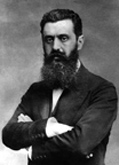
Theodore Herzl
Fast forwarding into modern time, we find many new personalities of God’s choosing whose express purpose is to fulfill the divine agenda. The genesis of modern Zionism begins in the 1890s with a man named Theodore Herzl. He was a Jewish lawyer from Vienna who maintained the view that the Jewish people should assimilate into the countries in which they were living. This view was destined to change, however, after he witnessed the anti-Semitic violence of the Dreyfus Affair—a French political scandal between 1890 and1900 that involved a Jewish officer being falsely accused of treason—and a realization of purpose overtook his life.
He wrote in “The Jewish State”: “I feel that with the publication of this pamphlet my task is done…Am I stating what is not yet the case? Am I before my time? Are the sufferings of the Jews not yet grave enough? We shall see. It depends on the Jews themselves whether this political pamphlet remains for the present a political romance. If the present generation is too dull to understand it rightly, a future, finer and better generation will arise to understand it. The Jews who wish for a State shall have it, and they will deserve to have it.” The road that would lead to the creation of the modern state of Israel would prove to be a very difficult one indeed. However, there seemed to be a knowing among those who were caught up in Herzl’s Zionist movement that this was an important time not just for the scattered offspring of Abraham but for the entire population of the world itself.
Herzl continues in his writing, “The Jewish State is essential to the world and it will therefore be created.” Although the father of modern Zionism saw that Israel was “essential to the world,” little did anyone realize just how “essential” this nation would become. Christian author and Oxford scholar Dr. Ron Moseley is correct when he argues, “Although many Christians have been taught that the Jews as a whole killed Jesus and as a result are eternally cursed, the truth is that they have been more successful under worse condition
s than any one race.” Myriads are the people who have admitted, and albeit some reluctantly, that the world could not exist without the Jewish people living within the family of nations. From presidents to philosophers, they line up to heap praise upon the sons of Jacob.
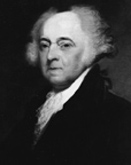
John Adams
Even Voltaire, the anti-Semitic French philosopher of the 1800s, said, “If I were an atheist, and believed in blind eternal fate, I should still believe that fate had ordained the Jews to be the most essential instrument for the civilizing of nations. If I were an atheist of the other sect, who believed or pretended to believe, that all is ordained by chance, I should still believe that chance has ordered the Jews to preserve and propagate to all mankind that doctrine of a supreme, intelligent, wise, almighty Sovereign of the Universe, which I believe to be the great essential principle of all morality and consequently of all civilization.” The second president of the United States John Adams agrees with Voltaire in respect to Israel: “I will insist that the Hebrews have done more to civilize man than any other nation.”
Comments such as these give way to the idea that whether you are an unwilling philosopher or a president-in-waiting, the presence of the Jewish people is an ever present reminder that the God of Israel is still at work among the affairs of men. Both Herzl and Voltaire use the word “essential” when describing the importance of bene Israel(Children of Israel) in a global economy. The foundation upon which this essential nation would be born was an unforgiving and hostile place. But it is from this empty expanse that greatness would arise and success would flourish, fulfilling the words of the prophets of old (i.e. Isa. 35:1).
The landscape at this time in history had not changed much from the environment found by Mark Twain when he wrote these words after touring the country in 1867: “A desolate country whose soil is rich enough, but is given over wholly to weeds…a silent mournful expanse…a desolation…we never saw a human being on the whole route…hardly a tree or shrub anywhere. Even the olive tree and the cactus, those fast friends of the worthless soil, had almost deserted the country.” Yet, it would be upon this deserted stage that God would redeposit the Jewish nation and from its dust build Herzl’s “essential” country.
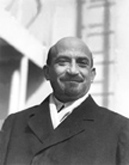
Chaim Weizmann – www.israelimages.com
If indeed the establishment of a Jewish homeland in the ancient land of Israel was the task of the Zionist movement, then it has found its fulfillment. On May 14, 1948, the modern state of Israel was born, completing the prophetic words of the prophet Isaiah that the nation would be born in a day (Isa. 66:8). Given that God Himself is involved with the establishment of the nation, one could expect that the produce and substance of such a happening, given its divine partnership with God, would indeed impact the world and prove to be the most “essential” element in nation-building ever seen. This divine spark is without a doubt the force behind the creation of the modern state of Israel and has become the fuel of the Zionist movement.
Chaim Weizmann, Israel’s first president—speaking to the United Nations is 1947, one year prior to Isaiah’s prophetic fulfillment of Israel’s reconstitution—describes his view of the divine spark when he said, “Palestine,for reasons which I need not labor, releases energies, activities in the Jewish people which are not released anywhere else. I shall not say that every Jew feels it. I am not going to say he feels it all at once. But there are sentiments which grow, in everyone of us, and the rocks, marshes, and sands of Palestine became a precious possession into which we pour our sweat, our blood, our effort and ingenuity to make it what it is.”
Weizmann—a secular Jew, who was not given to supernatural explanations—describes as “energies” what others may describe as an “anointing” or even as “supernatural influence.” Some would say it was the very moving of the Ruach HaKodesh (Holy Spirit) Himself. Indeed, most of the battles fought by the modern state of Israel have been proclaimed as supernatural or miraculous by many who witnessed their unfolding.
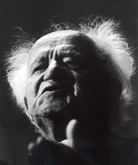
David Ben-Gurion www.israelimages.com /David Rubinger
Moseley is even more specific by listing a plethora of battles, starting with the Crusades of 1096 to liberate the Holy Land from the heathen through the Poland massacres of 1648–1656, ending with the Shoah of the Second World War, referring to the survival of the Jewish people as “miracles.” Moseley’s miracle perspective follows in the footsteps of David Ben-Gurion, Israel’s first prime minister, who said, “The Jewish people, returned to its own land, has been the greatest miracle of world history.”
Indeed, it is true that there are no other people or nation of people upon the planet who have been conquered, scattered, and returned to their original land twice, as the nation of Israel has been. American historian and Pulitzer Prize-winning author Barbara Tuchman once wrote that Israel is “the only nation in the world that is governing itself in the same territory, under the same name, and with the same religion and same language as it did 3,000 years ago.” Again, Ben-Gurion states, “In Israel, in order to be a realist, you must believe in miracles.”
Again, combined with the divine, Herzl’s Zionist movement, Weismann’s “energies,” and Ben-Gurion’s “miracles” birthed the state of Israel. It is this group of people, which stood in the face of insurmountable odds and survived Nazism and Fascism, that would eventually become, in the words of Herzl, the “finer and better generation” that would achieve his goal of national statehood and experience the fulfillment of the Zionist cause.
Building the modern nation of Israel started with a bang in a very literal way. After just 12 short hours of national life, the entire Arab world declared war on the infant Jewish nation. This declaration of war was to draw the entire region into the War of Independence. Staring down the gun of the entire Arab world, infant Israel, with her pitiful handful of weapons, was about to write a modern-day version of the miracle battle of David and Goliath.
John Westwood writes in his book on Middle East wars, “But they were to attack from several directions against Jewish forces that were tiny, and not so much ill-equipped as non-equipped.” He describes the state of the Palmach, containing only 3,000 soldiers of both sexes. They possessed less than 1,000 rifles and perhaps a similar number of machine guns, and their ammunition supply was enough to last only a few days. They commanded no armored units and only 11 civilian light aircraft, single- or twin-seaters, with about 20 pilots to fly them.
The result was again a manifestation of Ben-Gurion’s “realist miracles,” as the combined Arab forces were routed and a victory that was to become the substance of dreams became a reality. American columnist and political commentator Charles Krauthammer said, “They weren’t. They aren’t anywhere. Their disappearance into the mists of history since the time of the exile from Israel in 722 B.C. is not mystery. It is the norm, the rule for every ancient people defeated, destroyed, scattered and exiled, with one exception, a miraculous story of redemption and return, after not a century or two, but 2,000 years. Remarkably, that miracle occurred in our time.”
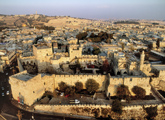
www.israelimages.com
As June 1967 approached, the turbines of Weismann’s “energies” began to turn once again. Not since the days of Jericho had the world witnessed the type of victory that was about to unfold. Jewish teacher and writer Daniel Pinner penned the following:
“It is appropriate, therefore, to address the question: What was the single greatest miracle of the entire Six Day War? Not an easy question, for there are so many miracles, both hidden and revealed. There is no end to the stories that have been documented from the battles: of the Egyptian tank commander in the Sinai Desert who surrendered to a vastly inferior Israeli force on the second day of the war, because a desert mirage made him see hundreds of Israeli tanks where there were no more than a dozen; of the Jordanian forces who welcomed the Israeli tanks under the command of Colonel Uri Ram into Shechem on the third day of the war, because faulty communications misled the Arabs into thinking that these were Iraqi tanks come to reinforce them; of the battle of Ammunition Hill on the northern outskirts of Jerusalem, which was captured by an Israeli scout by mistake when he fell into a Jordanian trench in the moonless night at 2:00 o’clock on Tuesday morning and started shooting form the hip (and the fall of Ammunition Hill was the necessary prelude to the capture of the Old City 30 hours later).”
The sentiments are the same whether one is reading from secular or religious sources on the formation of Zionism’s modern state of Israel. Time would fail us to mention all the recorded “miracles” and “energies” experienced from 1948 to 1967, but it is sufficient to say that without the handiwork of the Almighty, nothing would remain of the sons and daughters of Abraham. Moseley argues “Even a casual look at the ‘War of Independence‘ in 1948, the ‘Suez Affair‘ against the Egypt in 1956, the ‘Six Day War’ miracle of 1967, and the Yom Kippur War victory of 1973 ought to convince anyone that God has His eye on modern Israel.”
With the borders firmly established by the Six-Day War and aliyah (immigration to Israel) on the rise, the foundation of the Zionism’s aspirations of a modern state of Israel could be considered complete. According to Moseley, God’s “eye” would find itself once again trained on Israel on Yom Kippur (Day of Atonement) of 1973. The Golan Heights was to become the latest in the list of convincing miracles that would confirm God’s intent for a Jewish homeland.
Michael Greenspan, a documentary film maker, recounts the story of a group of Israeli soldiers in the Golan carefully making their way to a nearby village on a cloudless October night. Suddenly, the soldiers find themselves in the middle of a mine field. As the soldiers begin to poke around with their bayonets, trying to locate the mines, a strange wind suddenly appears. This wind was so strong that it blew away 18 inches of topsoil from the minefield, exposing over 1,000 mines. As soon as the mines were exposed, the wind ceased, and the men walked out of the field to a moonlit night. The examples of such miracles in the founding of Israel should prove convincingly to the open-minded that the Lord of Host commands the armies of Israel.
 And so it happens time and again in the face of insurmountable odds, the tiny forces that Westwood describes defeated the giant of the combined Arab world. David had once again defeated Goliath in a battle not fought on some distant Judean hilltop but on a stage that was to command attention from the entire world. Truly, it can be said that the birth of God’s nation started with a bang and Herzl’s finer generation had finally taken center stage among the family of nations. Israel’s Ministry of Foreign Affairs declares the deliverance of the Jewish people during the War of Independence as “a miracle [that] occurred at a moment of desperation.” Miracles are what defined the existence of ancient Israel, and it is the miraculous that once again was to define the story of the reconstitution of the modern state of the nation of Israel and the realization of the Zionist vision.
And so it happens time and again in the face of insurmountable odds, the tiny forces that Westwood describes defeated the giant of the combined Arab world. David had once again defeated Goliath in a battle not fought on some distant Judean hilltop but on a stage that was to command attention from the entire world. Truly, it can be said that the birth of God’s nation started with a bang and Herzl’s finer generation had finally taken center stage among the family of nations. Israel’s Ministry of Foreign Affairs declares the deliverance of the Jewish people during the War of Independence as “a miracle [that] occurred at a moment of desperation.” Miracles are what defined the existence of ancient Israel, and it is the miraculous that once again was to define the story of the reconstitution of the modern state of the nation of Israel and the realization of the Zionist vision.
If one is to paint Zionism with a broad brush as a progressive movement beyond the mere creation of a modern state—as an expansionist view of total Davidic land recovery—then truly Herzl’s finer generation has yet to manifest. Only with this view in mind could the Zionist dream be deemed unfulfilled and labeled a failure. It is the perspective of this writer that failure has not occurred within the Zionist agenda.
The purposes of God have indeed been accomplished through His chosen vessels throughout the ages, and the modern State of Israel is, in fact, the regathered seed of Abraham. Are these regathered seeds living in the fullness of God’s promise? No, but neither are most Christians living in the fullness of the Kingdom of God. However, the Christian lack of total kingdom occupation (i.e. the promises) does not mean that the kingdom does not reside within us. In like manner, the lack of full territorial possession on the part of Israel does not take away from the glorious return of Jacob to the Land of promise and the fulfillment of the Zionist dream of statehood.
Zionism’s future lies in its past. Some 4,000 years ago, prophetic words were spoken that would seal the fate of Zionism’s future aspirations. The standard has been firmly planted in the soil of promise and cannot be removed—never again will Jacob be plucked out of his land (Amos 9:15). Both Jews and Christians now await Messiah’s triumphal arrival in the recaptured Land of Israel to secure the foretold boundaries given to Abraham so long ago. Until Messiah’s time shall present itself, the responsibility of Zion’s future falls to all of us. Zion’s future has become our future; our destinies are bound together in the responsibilities communicated through God’s Word. We long for the day when all the land of Canaan is called Israel, when peace reigns supreme, and when Jerusalem is a praise in the earth.
Until the manifested reality of Zionism’s Messianic future is upon us, all who find themselves under God’s watchful eye should hold Isaiah 62:1 as their anthem: “For Zion’s sake I will not hold My peace, and for Jerusalem’s sake I will not rest, until her righteousness goes forth as brightness, and her salvation as a lamp that burns.”
Greenspan, Michael. “Against All Odds,” (documentary film). Pictures LLC, distributed by American Trademark, USA, 2007.
Herzl, Theodore. “The Jewish State.” New Mexico: Courier Dover Publications, 1988.
Israel Ministry of Foreign Affairs. “Israel’s War of Independence.” 2008. www.mfa.gov.il/MFA/History/Israel+wars
Kolatch, J. Alfred. Great Jewish Quotations. New York: Jonathan David Publishers, 1996.
Krauthammer, Charles. “Israel: The miracle at 60.” 2008. www.rochester.ndymedia.org/newswire
Moseley, Ron. Lectures on Israel Today. Arkansas: American Institute of Holy Land Studies, 1999.
Pinner, Daniel. “The Six Day War: Recognizing the Miracle.” 2007. http://www.israelnationalnews.com/Articles/Article.aspx/7133
Silbiger, Steven. The Jewish Phenomenon. Georgia: Longstreet Press, 2000.
Twain, Mark. The Innocents Abroad. New York: New American Library, 1966.
Westwood, John. The History of War in the Middle East. Massachusetts: World Publications Group, 1984.
Wiezmann, Chaim. “Report of the General Assembly.” New York: United Nations, 1947.
All logos and trademarks in this site are property of their respective owner. All other materials are property of Bridges for Peace. Copyright © 2024.
Website Site Design by J-Town Internet Services Ltd. - Based in Jerusalem and Serving the World.